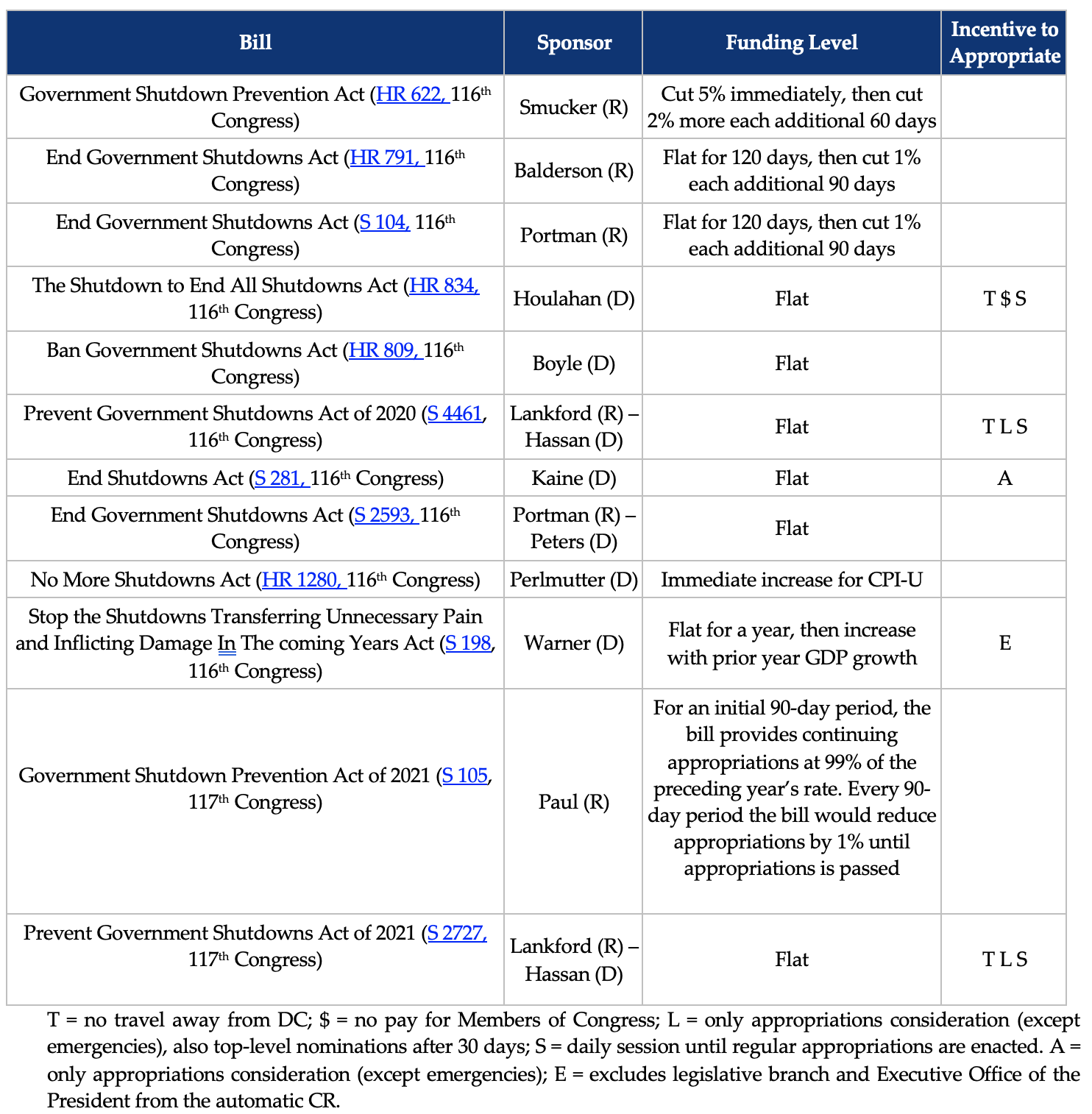Prevent Government Shutdowns Act of 2021 Introduced in the Senate
Recently, Senators James Lankford (R-OK) and Maggie Hassan (D-NH) introduced the Prevent Government Shutdowns Act of 2021 (PGSA). The bill would authorize an automatic continuing resolution (auto-CR) at current spending levels until lawmakers can reach an agreement on appropriations and create other incentives for the timely completion of appropriations work. The Committee for a Responsible Federal Budget has supported auto-CRs as part of our Better Budget Process Initiative. Auto-CRs can prevent unnecessary costs from being imposed on the public due to a government shutdown.
There have been twenty funding gaps during the modern budget era, the most recent being the 2018-2019 shutdown and the January 2018 shutdown. The public feels the effects of government shutdowns in a variety of ways without this automatic funding: Social Security and Medicare benefit verifications and card issuances cease, Environmental Protection Agency and Food and Drug Administration inspections are delayed, and Transportation Security Administration agents and air traffic controllers go unpaid, which has put a strain on air travel during previous shutdowns.
Government shutdowns also come with permanent fiscal and economic costs despite the temporary loss of services. The Congressional Budget Office (CBO) estimated that the 2018-2019 shutdown resulted in an unrecoverable $3 billion loss to the economy, and that last three shutdowns collectively have cost taxpayers nearly $4 billion.
PGSA addresses government shutdowns by automatically extending appropriations at current funding levels for two weeks at a time, preventing funding gaps and ensuring all government services are still able to operate even if lawmakers reach an impasse. PGSA also creates incentives to prevent appropriation lapses altogether. The bill would prioritize appropriations work in Congress by prohibiting all other matters besides general appropriation measures from being considered while an auto-CR is in effect, which could only be waived by a two-thirds vote for a period of no more than seven days. Official travel would be prohibited for members of Congress – including their personal staff and Committee staff, as well as White House budget staff – if the October 1 appropriations deadline is not met, while taxpayer-funded travel allowances and other travel reimbursements would be cut off and daily mandatory quorum calls would be required.
Previously, the Prevent Government Shutdowns Act of 2020 was reported favorably by the Senate Committee on Homeland Security and Governmental Affairs by a vote of 10-2 (the two members voting "no" each had their own auto-CR bill). In addition, we have previously estimated the PGSA would have little-to-no negative fiscal impact.
Auto-CRs have previously attracted a broad range of bipartisan support and proposals. All proposed legislation would continue to fund programs at levels close to the prior appropriated amount, but vary on spending rates and incentives to appropriate. Below is a table summarizing the various auto-CR proposals and their effects.

Source: "Better Budget Process Initiative: Automatic CRs Can Improve the Appropriations Process."
PGSA would strengthen the budget process by encouraging the timely passage of appropriations legislation and mitigating the harmful effects of government shutdowns. Maya MacGuineas, president of the Committee for a Responsible Federal Budget, praised the introduction of the Prevent Government Shutdowns Act of 2021:
“Government shutdowns are completely avoidable and have negative effects including disrupting government services, reducing economic activity, and wasting government money. Establishing an automatic continuing resolution with incentives for lawmakers to stick around and finish the job of funding the government is a smart approach. We applaud Senator Lankford (R-OK) and Senator Hassan (D-NH) for introducing the Prevent Government Shutdowns Act, which would ensure we never have another shutdown. This bill would be a good first step in reforming our broken budget process so lawmakers can stop focusing on short-term crises and do the long-term planning our country needs.”
Learn more about government shutdowns here.


